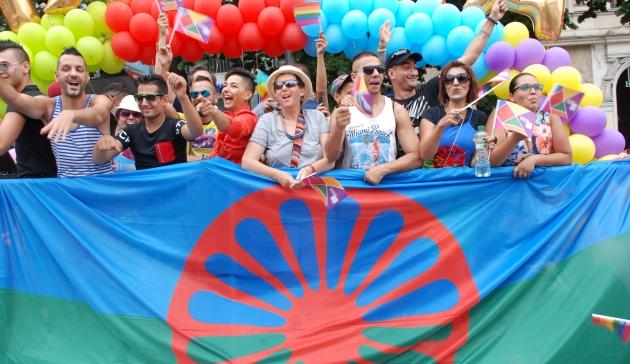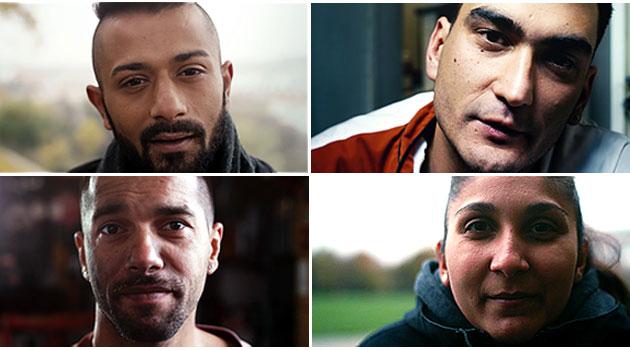Third international Romani LGBTI conference discusses homophobia in non-Romani and Romani society

At the beginning of June in Strasbourg, France, the third international conference on the topic of upholding the human rights of the LGBTI members of the Romani community was held. The conference was co-organized by the ARA ART group, whose director is David Tišer, an activist, artist, and Romani Studies scholar who is a member of both the LGBTI and the Romani communities.
The meeting discussed homophobia from the side of majority societies and Romani people as well as the need to establish effective interventions so that persons of non-heterosexual orientation might feel safe in society. The presence of leading representatives of international institutions at the meeting, according to Tišer, confirms the gravity of this issue.
Given the fact that LGBTI Roma face multiple discrimination, Tišer emphasized the need to use both the international rainbow flag symbolizing the LGBTI community when presenting this subject as well as the international Romani flag. News server Romea.cz asked him how the conference went and how he perceives the current situation when it comes to respecting the rights of LGBTI community members within the Romani community.
Q:How do you assess this year’s conference? Was it different than the two preceding ones?
A: All three conferences have been very meaningful for me. The focus of the previous two was the creation of the European LGBTI Roma platform, the sharing of experiences, and the formulation of the needs of the LGBTI Roma in Europe. It is necessary to say at the beginning that this third conference was organized by the Sexual Orientation and Gender Identity Unit, the Special Representative of the Secretary General for Roma Issues, and the Youth Department of the Council of Europe in collaboration with ARA ART, z.s. The main aim of this meeting, attended by important international institutions involved in combating discrimination and human rights violations, was to formulate recommendations for the Council of Europe to then make to the Member States.
Q: Which contribution during the conference captivated you the most? What would you highlight from the program?
A: All the contributions presented by our colleagues from other states as well as the representatives of European institutions were very beneficial for me. The information we got there was not everyday information, after all. However, for me personally what were also very imporant were the outputs of the various thematic work groups. Those closing outputs will be published on our wesbite soon.
Q: Is the situation in the Czech Republic as far as advocating for the human rights of the LGBTI Roma community somehow specific compared to other states across the EU?
A: The LGBTI members of Romani communities experience multiple discrimination irrespective of the counry in which they live. These people face very similar problems in their countries. Here it is necessary to distinguish between two levels. The first is the legislation of the state, and the second is the perception of LGBTI people by Romani communities. As far as legislation goes, it generally applies that the further west we go from the Czech Republic the situation is more favorable, and unfortunately it is the case that the eastern counries still do not have sufficient legislation in the area of protecting the human rights of this minority. From my perspective, the Czech Republic finds itself somewhere in the middle of this process.
Q: The photo of the conference participants holding the international Romani flag together with the symbolic rainbow flag of the international LGBTI community sparked a stormy discussion on your Facebook profile. What was that about?
A: First and foremost, I am convinced that this was not a discussion, but displays of hate and homophobia worthy of racists. All honor goes to the exceptions! The “discussion” took place not only on my Facebook profile, but on many others. From the beginning of the “discussion” it seemed that some Romani people were actually bothered by the fact that LGBTI Roma were holding the Romani flag. They justified that, for example, by saying that if the LGBTI members of the Romani minority present themselves with the Romani flag, it could mean that all Roma are gays or lesbians. They also used the concept of Romipen – traditions, the legacy of our forebears, etc. During this exchange of opinions over several days what resulted from the “discussion” was their conclusion that there is an actually very mundane reason for our having taken that photograph, namely, that I must be personally making money off of this subject.
Q: How do you explain the fact that some people who frequently encounter discrimination themselves, rejection because of their own membership in a minority, are committing this kind of behavior? What’s more, the invective in this “discussion” on Facebook was not expressed just by “ordinary” Romani people, but by Romani men and women who are active in the area of combating discrimination against Romani people.
A: Well, I’d like to know that myself. I am more than shocked by the fact that we allow such people, who call themselves human rights activists, to defend our rights. What is even more shocking is that some of the “discussants” expressing these homophobic opinions are representatives of Romani political parties defending the rights of Romani people, and some are members of a Romani women’s network defending the rights of Romani women.
Q: For you, as an organization that runs a counseling cener for gays and lesbians who are Romani, are these commentaries determinative for your future work?
A: While we know that these homophobic commentaries reflect the prejudices that many of the clients of our counseling center face, for our organization this form of “discussion” is not authoritative. Our aim is to aid the people who contact us. We will continue that effort. One component of our work is organizing and supporting various campaigns and outreach actions, which includes Prague Pride.
Q: Can’t such a “discussion” negatively influence gays or lesbians who have not yet come out?
A: First and foremost I would like to say that beneath the photo there were also many positive reactions from people who expressed their solidarity and support. I greatly appreciate especially the support expressed by Romani men and women who were born before I was born, who have expressed the humanity that is so important here. In connection with the question you have asked, naturally there exist many risks that such young people will lose courage and/or fall into even greater hopelessness. It is regrettable that the initiators of this “discussion” are absolutely unaware of the consequences of their actions. It is appropriate here to name the problems that Romani men and women, and not just young ones, come to us about. This is an entire range of problems beginning with ridicule that grows into bullying, intimidation, forcing people to enter a heterosexual relationship, physical harm, exclusion from families, depression, suicidal tendencies, etc. They grapple with this in Romani families whose members are convinced they are acting in the name of tradition. That is why I would like to thank all of my extended family, who actually behave according to the Romani tradition of loving your children no matter what!
Q: What degree of homophobia do you encounter among Romani people compared to what you notice among non-Romani people?
A: It’s not so much about the degree of homophobia as it is about what harms you more. Generally, the level of homophobia in Romani communities reflects the level of homophobia in the majority society. Those closest to you, those whom you care about the most, are the ones best able to harm you. For that reason, homophobia among Romani people is much more dangerous, because Romani men and women who are LGBTI may lose the only safe space they have if their loved ones reject them.
Q: People of non-heterosexual orientation were imprisoned in concentration camps during the Second World War. Today horrifying testimonies are coming to us about something similar occurring right now in Chechnya. Did you manage to raise this subject at the conference and confront the representatives of the Council of Europe about it?
A: That topic was also a component of the discussion there. However, we primarily focused on the situation of the LGBTI people who are Romani. As an example, I can tell you the story of a gay Romani couple from Serbia who had to emigrate to Germany because one of their families wanted to literally cut their throats. In Germany they were placed in a detention camp, where of course they were also in constant danger. To answer your question, I would also like to mention that people who were LGBTI were systematically murdered by the Nazis, just like Romani people, Jewish people, and members of other groups whom the Nazi regime considered “asocials”, “inadaptables”, “deviants”, and “inferior”. For example, the Czech historian Anna Hájková, who works at a university in Warwick, England, writes about this “blank space” on the historical map of the Holocaust in very moving terms. It is, therefore, quite striking that Romani people who are homophobic, who reject LGBTI members of Romani communities, are not aware of these historical parallels and similarities, or if they are aware, they are not capable of any compassion or empathy.
